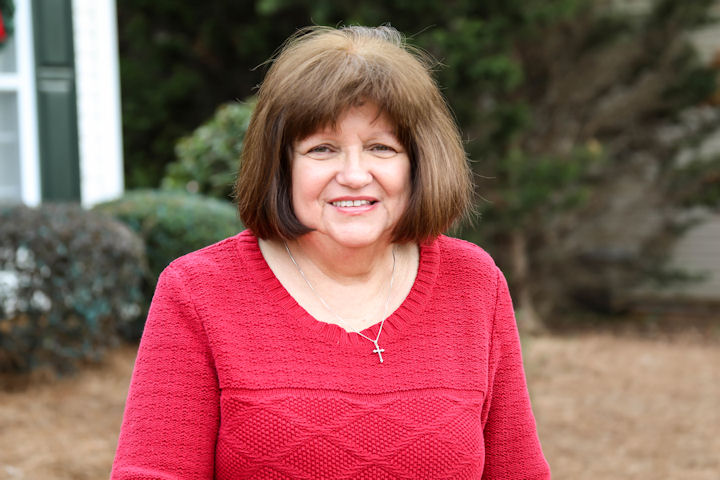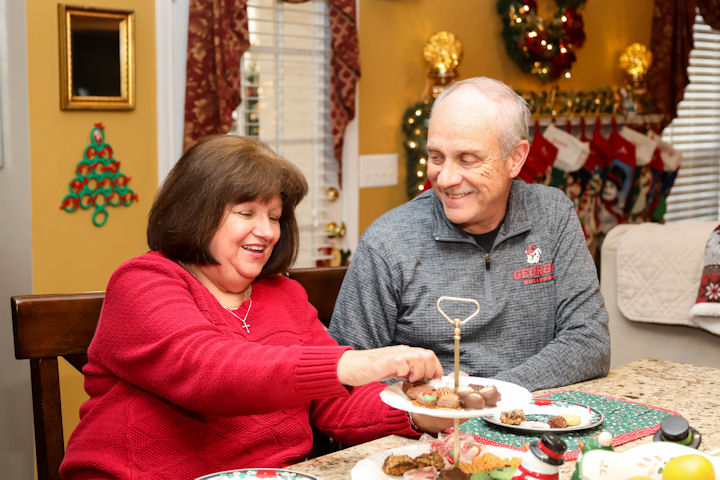Deborah Fessler was used to traveling to Atlanta once a month for her doctor’s appointment and infusion — but she didn’t like it.
Fessler, who has multiple sclerosis (MS), needs intravenous medicine each month to control her symptoms. Her husband would take a day off from work to drive her to the appointment, wait several hours for her infusion and then drive her home.
“Your whole day is pretty much gone, and you have to fight traffic and pay for parking,” Fessler said. “I’d usually have to call the doctor’s office from the interstate to tell them I was running late because of traffic.”
Then she learned about the Tanner MS Center at Tanner Medical Center/Villa Rica and how specialists from The Multiple Sclerosis Center of Atlanta provide doctor’s appointments and infusions for MS patients there.
“This has made a huge difference for us because it’s just three miles down the road from our house,” Fessler said. “It’s such a blessing to have access to MS experts and treatments so close to home.”
The infusion center at Tanner Medical Center/Villa Rica serves patients with a wide variety of conditions who need medicines intravenously. The center was designed for the comfort and safety of patients, with big comfy chairs that are easy to climb in and out of, non-slip floors and doors that open by simply waving a hand. It also offers Wi-Fi and individual televisions.
“When you have a health condition to manage, it gives you peace of mind to be able to get care close to home,” Fessler said. “I’m very thankful that we have this in west Georgia because when I go visit my dad in middle Georgia, I see how specialists are at least an hour away for them.”
Each month, a different MS specialist from The MS Center of Atlanta comes to Villa Rica to see patients.
“They are experts at what they do, but they’re also so friendly and they make me feel at ease,” Fessler said.
The nurses at the infusion center at Tanner Medical Center/Villa Rica make a huge difference in each patient’s experience, Fessler said. The center has a team of nurses who place the IV line for each patient, administer the medicines intravenously and monitor patients during and after their infusions. Doctors also supervise the center.
“The nurses are very compassionate and understanding, and they take time for you as an individual,” Fessler said. “They take such good care of you and keep you happy, so you almost forget you are there for an infusion.”
Fessler also enjoys connecting with other MS patients who are receiving their infusions.
“It’s great to be able to chat with them,” she said. “We share our experiences and it’s very therapeutic to talk with other patients who really understand your condition.”
 Patients also bring food to share and celebrate holidays together, said Fessler, who made a goblin cheese ball and cookies for Halloween and has already picked out a Christmas cookie recipe to bake.
Patients also bring food to share and celebrate holidays together, said Fessler, who made a goblin cheese ball and cookies for Halloween and has already picked out a Christmas cookie recipe to bake.
“It just makes it more fun,” she said.
Multiple sclerosis is a disease where the body’s immune system attacks the protective covering of nerves. This nerve damage disrupts the brain’s communication with the rest of the body.
It can cause pain, tingling sensations, fatigue, impaired coordination, vision loss and more.
Since she was diagnosed with MS in 2000, Fessler has tried several MS treatments. The previous ones required her to have injections weekly or every three days.
She started doing a monthly infusion of a drug called Tysabri about four years ago. The medicine has made her condition a lot easier to manage.
“It’s amazing how things have advanced since I was diagnosed, and they keep coming out with treatments that are more effective,” Fessler said. “It gives me a lot of hope for the future.”
Her symptoms include fatigue, problems with mobility in her legs and some pain. Once a year, she gets an MRI to assess the damage that MS has done to her nerves. She is grateful and happy to report that the MRIs in recent years have not shown any new damage.
“This treatment has really kept it under control and prevented it from getting any worse, so I can live my life to the fullest,” Fessler said.
Fessler, 63, and her husband have four grown children and seven grandchildren. She enjoys helping take care of her grandchildren and being involved in their activities.
“I’m usually either at a ball field watching one of them play or doing something else with them,” she said. “It’s a great joy to spend time with them.”